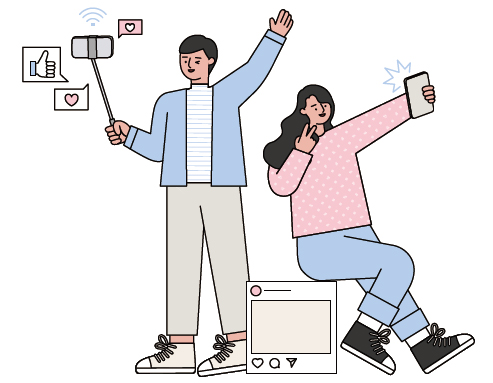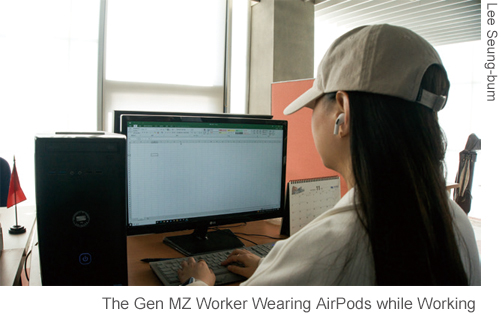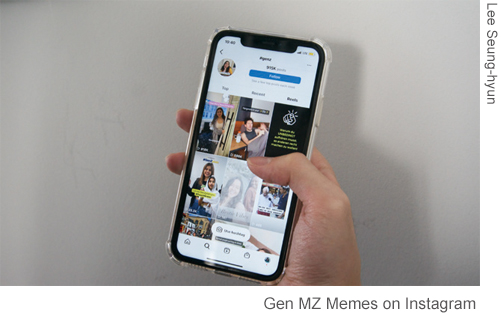
The use of the term Generation MZ has recently kept appearing in various types of media in Korea. Gen MZ is a compound word that includes Millennials and Gen Z. Millennials are the people born from 1981 to 1996, and Gen Z is those born from 1997 to 2012. Short videos showing certain traits of Gen MZ frequently go viral and can be easily seen on Instagram.
For example, many videos depict Gen MZ working as a lawyer, teacher, or flight attendant, and most of them highlight freewheeling moments of the generation. In addition, the Korean version of Saturday Night Live has been drawing significant attention from people in Korea by sarcastically emphasizing the characteristics of Gen MZ. In the show, there is a series called “MZ Office,” which portrays extremely individualistic aspects of Gen MZ in comparison to the older generation. One of the characters in the series always wears AirPods while working and refuses to take them off. As such, the word “Gen MZ” has emerged as a hot potato.
Although Millennials and Gen Z are respectively different generations, they are normally classified together in Korea since many of their characteristics are considered similar. Gen MZ is deemed unique owing to its traits. In comparison to the older generation such as the Baby Boomers and Gen X, they tend to be more individualistic, freewheeling, and straightforward and prioritize themselves over others. On the other hand, they also belong to the Angry Generation.
A great number of Koreans born between the early 1980s and early 2000s have difficulties finding decent jobs, and this harsh reality has left them discouraged and frustrated. Such an environment has forced them to pull out of traditional stable lives, such as getting married, having children, and owning a home.


Furthermore, Gen MZ is regarded as the most open-minded. They care about various social issues and do not hesitate to put their thoughts into action. A great example of this mindset is value consumption, which is a popular trend among Gen MZ. They expect brands to actively play a role in terms of social justice such as climate change and animal welfare, which also makes them distinctive from previous generations.
This tendency has been confirmed by many researches and surveys. According to the “2021 MZ Generation Eco-Friendly Practice and Consumption Trend” report by the University’s Tomorrow 20s Research Institute, 68.8 percent of Gen MZ were supportive of eco-friendly corporations when asked about their perception of corporations’ eco-friendly activities. Moreover, 74.3 percent responded that establishing eco-friendly policies and carrying out eco-friendly activities are essential for companies to grow and develop in the future.
The trend of the young generation does not seem to be limited within borders. The research conducted by the Pew Research Center, a U.S. based research institute, also proved that Gen MZ pays closer attention to social issues, especially climate change. In the survey, when people were asked about engaging with climate change, Gen Z were particularly likely to express anxiety about the future.
Among social media users, 69 percent of those in Gen Z responded that they felt anxious about the future when they saw content addressing climate change. Additionally, 59 percent of Millennial social media users said they felt the same way, while only 46 percent of Gen X and 41 percent of Baby Boomer social media users indicated they were concerned.
Conflicts Between Gen MZ and the Older Generation
Many generational conflicts in recent days stem from the difference between Gen MZ and the older generation. How Gen MZ views the world is significantly different from the previous generations. The workplace is a great example demonstrating this phenomenon.
Compared to the older generation, Gen MZ displays a stronger tendency to pursue much more work-life balance. While the older generation is more willing to devote themselves to work, Gen MZ does not consider work the most crucial part of their lives. A survey conducted by the Korea Chamber of Commerce and Industry reflects this tendency.
Regarding “Is it acceptable to work overtime for a great performance?,” 35.5 percent of those in their 40s and 42.8 percent of those in their 50s provided positive answers. On the other hand, only 26.9 percent and 27.2 percent of those in their 20s and 30s were positive, respectively, revealing a large difference. This is a general phenomenon taking place all over the world including in Korea. “Gen MZ values work-life balance and the culture of their companies.
They also want their autonomy to be respected. Hence, it is important to consider their special traits while operating a corporation. Retaining great employees is much more important than simply hiring them,” Stella H. Kim, Chief Marketing Officer of HRCap.
How does Gen MZ act at home? As previously mentioned, Gen MZ does not associate their goals with marriage anymore. Most people in the older generation normally tied their goals or identities to marriage, having children, and being part of a family.
However, Gen MZ does not think marriage is essential in their lives as they are more individualistic than the older generations. “I do not think it is necessary to get married or have children. I already feel good enough by myself. I want to put myself first because it is my own life,” said Kim Si-yeon (Dept. of Geoinformatics, ‘21). As such, the opinion of Gen MZ on family is so different from the older generations that it sometimes causes another type of conflict. This is also one of the most notable differences and conflicts between Gen MZ and the older generations.

Gen MZ also exhibits distinct traits in school. To fully understand them, it is important to be aware of how familiar they are with electronic devices. The majority of university students use a laptop, tablet computer, or phone for academic purposes rather than paper books, which was unimaginable in the past. At the same time, they are less willing to get along with others than the older generations.
Gen MZ does not necessarily feel required to belong somewhere or have many relationships in university. This is the trait that stands out, especially among Gen Z. Furthermore, COVID-19 made it difficult for students to be properly socialized over quite a long period, thus deteriorating this situation. As such, their characteristics are strongly displayed in school as well as at work and home.
Main Cause of the Conflicts
The main cause of the conflicts between Gen MZ and the older generation is the intergenerational cultural lag. In the 1950s, South Korea was one of the poorest nations in the world as a result of the Japanese colonial period and the Korean War and so people in Korea were living a hardscrabble life. The nation had to contribute to economic growth in full force, and the rights and interests of individuals such as welfare, ethics, or discrimination were rarely a public concern.
With the rapid development of technology and the economy, in the 1990s, industrialization and democratization were achieved. Therefore, people in the 1990s began to achieve a higher quality of life, and this was when the problems of sexism, discrimination, welfare system emerged.
The problem of employment is also one of the main reasons for the conflicts. In the past, South Korea was developing its economy by adopting a labor-intensive industry to revive the populous country into an industrialized nation. The most essential part of a labor-intensive industry is the personnel expenses, but it was hard to maintain this in the long-term because more means were needed when people started to support a family rather than living alone. Under these circumstances, many companies adopted the lifetime employment system under which employees were paid low salaries and granted a pension after their retirement.
However, after the rapid industrialization, contract-based employment, rather than lifetime employment, emerged. As no more pensions are paid after retirement, working hard now and saving money for the future became important. As a consequence of this employment structure, all the younger and older generations are now in an era of endless competition and competing to obtain the same workplace.
Furthermore, the confrontation between progressivism and conservatism in Gen MZ and the older generation also creates conflicts. According to statistics compiled by Gallup Korea, those aged 18 to 56 consider themselves progressive, while those aged 57 or above responded that they were more conservative. These answers are supported by the exit polls by the three main broadcasting companies in Korea.
In a survey asking about the approval rating in the 2022 presidential election, approximately 47.8 percent of electors around the age of 20 voted for the Democratic Party of Korea (DPK), while 45.5 percent voted for the People Power Party (PPP). Ages around 40 were also considered more progressive, as 60.5 percent of people voted for the DPK, and 35.4 percent for the PPP. On the other hand, 67.1 percent of people around 60 were considered conservative as they voted for the PPP, while 30.8 percent voted for the DPK.

As the result shows, the older generation tends to protect their vested interests and maintain their own outlook with which they are familiar. Meanwhile, the younger generation tries to follow the trends and break down the newly emerging problems. Due to this situation, both generations inevitably start to clash, and the older generation becomes more rigid and authoritarian because of the response of Gen MZ, and the new generation also becomes more reformed and rebellious in opposition to the older generation.
The UOS Times interviewed K who has been working with Gen MZ workers to understand generational differences in greater depth.
Q1. Do you see any differences between Gen MZ and the older generation at work?
A1. Yes, I do. At first, I had a hard time getting used to working with Gen MZ employees since how they view the concept of work is extremely different from the older generation. Whereas the older generation employees put work on the top while working, Gen MZ employees put themselves first even when they work, which I think many differences between them come from.
Q2. Are there any specific cases where you found the Gen MZ workers different from the older generation workers?
A2. I am in charge of the marketing department at the company, and once I asked team workers to have dinner all together after work. I thought everyone on my team would join. However, some Gen MZ team members told me they could not join because of their personal schedules, which came as a quite big shock to me. Having dinner or drinking with coworkers after work has been a very common culture in Korea, and people in my generation have felt somewhat obligated to it.
Q3. How do you deal with the differences? Do you think there is a way to solve generational conflicts?
A3. I try to put myself in their shoes. I also struggled to fully embrace them in the beginning, and the struggle is still going on. I do not think the end of generational conflicts will ever come. It is an endless story, so everyone should admit and remind themselves that we are all different. I believe what makes the world fun is differences, not unity.
Then, what is needed to resolve the conflicts between Gen MZ and the older generation? Achieving mutual communication and understanding is essential. The opportunities to have contact with other generations are becoming less common. In this regard, people are demanding an intergenerational integration program, and an economic policy for the ongoing recession has to be set to resolve the employment crisis.
In addition, as a member of a society, people should act with more compassion and make more mature decisions. Since a lot of debates on social issues are becoming extreme, and people are being divided, it is necessary to allow rational discussions based on tolerance and generosity. If our society becomes more mature, overcoming the generational conflicts would be feasible.
Lee Seung-bum
okok3037@uos.ac.kr
Lee Seung-hyun
nicole3212@uos.ac.kr

